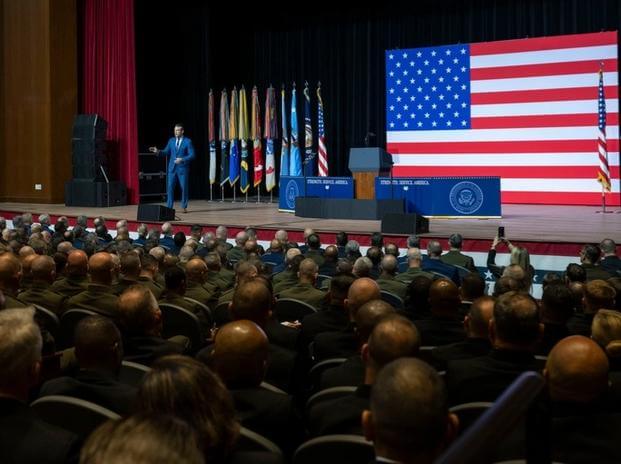“You are not civilians. You are set apart for a distinct purpose.” That line didn’t drift across the packed room at Quantico; it hit like a challenge coin thrown on the table. War Secretary Pete Hegseth didn’t come to soothe egos or manage optics. He came to draw a line. Military leaders would be responsible for identity, increasing standards, and real accountability. Agree or disagree with his politics, the speech demanded something every military professional should recognize and welcome: clarity.
What Hegseth Got Right (and Why It Matters)
One standard for combat.
Hegseth’s call to consolidate to a single, job-relevant bar isn’t culture-war rhetoric; it’s common sense. The enemy doesn’t grade on curves. If the task is to carry, breach, climb, shoot, repair, or survive, the standard must map directly to that task. Either you meet it or you don’t. The proposed universal field test points in the same direction. You should measure what the mission requires, not what a spreadsheet finds convenient.
Commander authority without the handcuffs.
He’s not wrong that routine enforcement of things like grooming, punctuality, and fitness can feel like a legal ambush in slow motion. Tightening complaint processes so they can’t be weaponized is overdue. But the key is and/both. Leaders need to narrow the lanes for gamesmanship and keep bright lights on unlawful discrimination and harassment. Leaders need to feel free to lead, and concomitantly terrified to abuse.
Zero-defect is dead weight.
If you’ve ever watched good officers and NCOs play “career Jenga,” you know the drill. It comes out as doing nothing risky and changing nothing meaningful. Hegseth threw a grenade into that tent. Time will tell if the blast clears space for real initiative or just scorches the furniture. However, the intent is right that warfighting preparation beats résumé polishing.
Train like the job is lethal.
Less clicking, more rucking. More motor pool, more range time, more field time. Tougher basic training, within legal lines. None of that is nostalgic cosplay. It’s the real work that makes militaries great. Units don’t rise to the level of their PowerPoint prowess; they fall to the level of their repetitions. Repetitions matter, and more are needed to stay ahead of our adversaries.
Where the Risk Lives
We can’t pretend there’s no theater here. A cabinet official telling a room full of flag officers to get on board or resign is a high-wire act in a country primed to respond. The civil-military guardrails matter. Lawful orders, nonpartisanship, and equal protection aren’t “nice to haves.” They’re the bedrock. If the follow-through turns into payback or ideology in uniform, the whole project will backfire.
But if leaders hold the line and focus on task language, fair enforcement, and measurable readiness gains, the noise will fade and results will stand.

Three Leadership Takeaways Hidden in Plain Sight
“You are not civilians” is not a cudgel. It’s a calling. Here’s what it demands.
1) Mission identity beats personal identity.
The uniform means different obligations, stakes, and norms. That difference isn’t license to humiliate. Instead, it is a responsibility to deliver. Leaders who act as stewards of a mission identity make standards legible. It’s not just this haircut, this weight, this ruck, or this qualification. It is clearly linked to the task it protects. When troops see the “why,” compliance reads as professionalism, not politics.
2) Courage with guardrails.
Killing a zero-defect culture does not mean green-lighting cruelty. The balance is fast, fair enforcement plus visible recourse when something crosses the line. If we prune IG/EO processes to stop gamesmanship, then we double down on due process, equal treatment, and protection for lawful dissent. Courage without guardrails is bravado and guardrails without courage is bureaucracy. Warfighting requires both.
3) Train for the day you hope never comes.
Trust under fire is built the old-fashioned way: sweat, repetition, and honest feedback. Tough doesn’t mean toxic, and “old school” isn’t a time machine. It’s a standard that turns realistic reps into muscle memory.
The Takeaway for Leaders Wearing the Weight
If you’re a commander or senior NCO, here’s the work, stripped of slogans:
Translate standards into tasks. If you can’t explain the mission link in a sentence, fix the standard or fix your brief.
Muster with purpose. Use formation time to broadcast priorities, verify understanding, and backbrief. Then enforce evenly.
Protect the hard conversation. Psychological safety isn’t “be nice.” It’s “tell the truth quickly so we can fix it.” Guard rails on behavior make room for blunt talk about risk.
Model the reps. If you want your formation to treat training like it matters, treat your own time that way.
This moment will be read two ways. One audience hears a needed correction to a force drifting toward a generic workplace culture. Another hears political pageantry with a dare attached. Both readings can be true. What will decide the story isn’t the headline. It is whether standards, authority, and training translate into fewer dumb mistakes and more teams that are lethal when it counts.
“You are set apart for a distinct purpose.” That purpose isn’t to win Twitter. It’s to deter wars. If deterrence fails, to win them quickly. If the changes now on the table move us even one step closer to that outcome, they’ll be worth the heat. If they don’t, we’ll be reminded again that renaming is easy; it’s leadership that is hard.














